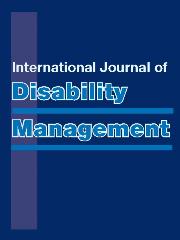No CrossRef data available.
Article contents
Employer costs of mental health claims and how psychologically healthy workplaces align with successful DM programs
Published online by Cambridge University Press: 12 November 2014
Abstract
Mental health (MH) and disability management (DM) businesses and DM professionals are proficient at addressing employee physical health, yet promoting employee MH is often ignored. Individuals claiming long-term disability (LTD), 85% identified MH conditions as their primary disability (Carls et al., 2012). Mental health LTD expenses are often higher due to longer recovery and challenges in return to work (Salkever, Goldman, Purushothaman, & Shinogle, 2000). Financial burdens of depression, anxiety, and emotional disorders are among the greatest of any disease condition in the workforce (Johnston et al., 2009). Globally, a fifth to a quarter of employees go to work everyday with a mental illness (Lorenzo-Romanella, 2011). Health care research has shown the impact of mental illness on work performance, however many employers and researchers are unaware of the value quality MH care has on employees and costs (Langlieb, & Kahn, 2005). The American Psychological Association (APA) identified five categories of workplace practices that promote psychological health in employees including: employee involvement; work-life balance; employee growth and development; health and safety; and employee recognition (APA, 2014). Organizational benefits of the five elements include: improved quality, performance and productivity; reduced absenteeism, presenteeism and turnover; fewer accidents and injuries; improved ability to attract and retain quality employees; improved customer service and satisfaction; and lower healthcare costs (APA, 2014). The presenters will discuss employer costs of MH claims and how psychologically healthy workplaces align with successful DM programs, decreasing MH claims and costs. Opportunities for future research include the United States Affordable Care Act (ACA) and its impact on MH (Mechanic, 2012) through provisions that encourage employers to adopt health promotion programs (Goetzel et al., 2012) and opportunities for research including comparisons of multinational employers regarding MH costs in countries with single payer systems, and in those without (United States), (Tanner, 2013).
- Type
- Abstract
- Information
- Copyright
- Copyright © The Author(s) 2014




